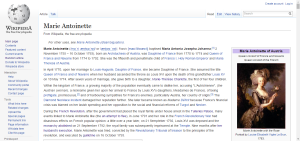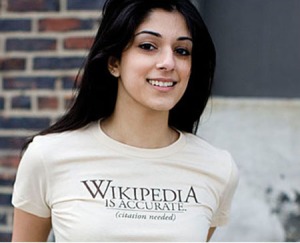
My, what lengthy articles you have.
Yes, this title is a Marie Antoinette reference…well sort of. Okay not really, but it’s a nice segue to my actual point.
Look at all that useful information you can learn about her. And wait, if you want to learn more you can check out one of the 183 citations, 18 books listed in the bibliography, the 9 listed in further reading, or 12 external links? Wow, thanks Wikipedia!
For the record, I’ve always been a fan of Wikipedia. I was the student who wondered why we couldn’t use it in high school.

Oh the annoyed looks I got from my teachers when I wore this.
Now don’t get me wrong, I was way too much of a goody two-shoes to actually defy explicit rules that might threaten my GPA, but I still made my displeasure known, be it through eye rolls, unimpressed looks on my face, or wearing this shirt, which I sadly no longer have.
As I said, I was a good student, always have been. I wasn’t the kid trying to slack off on the assignment by only using Wikipedia, I was just one who recognized that the site had merit…and citations. My books cited other sources, so what was so different about Wikipedia? Especially since at this stage of my education, original historical research wasn’t that big of a focus.
As Roy Rosenzweig states in his article “Can History Be Open Source? Wikipedia and the Future of the Past,” Wikipedia does not support original scholarship. That’s not its purpose; it is “an encyclopedia. Its goals go no further.”
So no, students should not be using Wikipedia as part of their argument in a paper. But, like an encyclopedia, it provides the necessary background information and a convenient list of sources for students to use as a starting point in their own research.
It is so thoroughly edited that unless you go to an article on a particularly contentious or popular topics, the information will be primarily accurate. He says that “the sheer volume of edits—almost 100,000 per day—means that entries, at least popular entries, come under almost constant scrutiny.”
Further, Rosenzweig states that “more than fifty-five thousand people have made at least ten contributions to Wikipedia.”
Crowdsourcing is an increasingly utilized aspect of the internet. As Paul Ford says in his article, Wikipedia “tapped into the basic human need to be consulted and never looked back.”
But they are definitely not the only ones. The Smithsonian Institution asked volunteers to transcribe historic documents. The Transcribe Bentham project did the same thing. Both were extremely successful.
The participants are not experts in the field, they’re not museum professionals or historians, but they are enthusiastic and willing to help. So why should we turn them away?
This situation feels very similar to the Rachel Onion article about the different history picture Twitter accounts. Like I said in my blog on that topic, instead of criticizing these informal, nontraditional versions of public history (and I use that term loosely), we, as historians, should work on improving our own methods until we become the go-to source.
As Paul Ford says in his article, “Humans have a fundamental need to be consulted, engaged, to exercise their knowledge (and thus power), and no other medium that came before has been able to tap into that as effectively.”
The beauty of the internet is its collaborative nature, so why are we trying to take that away or pretend like it doesn’t have merit? Wikipedia is one of those things that constantly amazes me because of how well it works. When I think about it conceptually it helps me believe that there are worthy people out there. People willing to spend their time writing or editing an article so that other people can share in their knowledge is amazing. And the variety in content is incredible.
A quick use of the “random article function” brought me to a page on Bleach, Christopher Riddle (a WWII Royal Air Force pilot), Barium ferrite (a chemical compound), and Elizabeth Montagu (an 18th century British social reformer).
Further, as Rosenzweig alluded to and as I mentioned above, Wikipedia is under constant scrutiny. As you scroll through different pages, you are likely to come across some variation of this note,
“This article needs additional citations for verification. Relevant discussion may be found on the talk page. Please help improve this article by adding citations to reliable sources. Unsourced material may be challenged and removed.”
Historians Tim Causer and Valerie Wallace argue that crowdsourcing “is a viable and cost-effective strategy only if the task is well facilitated, and the institution or project leaders are able to build up a cohort of willing volunteers.”
And that is exactly what Wikipedia is. So instead of harping on how it’s not scholarly (which it kind of is depending on your definition of scholarly), why aren’t we happy that people are going to it first.
Isn’t it better that students go to a site with clearly defined rules for objective points of view and citations than reading some random person’s blog? We go to Google first, it’s just what we do. And if we can get others excited about writing and contributing knowledge, how is that a bad thing?

Anna, It’s funny isn’t it how much Wikipedia has to defend itself. Thank you Rosenzweig for pointing out the site is simply an encyclopedia (and a good one at that)! You’re right to note Wikipedia is a good example of crowdsourcing as emulated by the Smithsonian the Bentham project. And, it was smart of you draw the comparison to Onion’s piece. Why is there still such resistance? Why are historians, who are so quick to critically examine sources, not able to think critically about the way they share their knowledge? I suppose they are or we wouldn’t have the evidence from this week’s readings. But my point is, I want deeper critical thinking. Maybe a better question is, to what end are we pursuing our research? Who do we hope to benefit? If it’s “the public” then why are we so scared to pursue crowdsourced input?
LikeLike
I definitely agree with all that you’ve said. I have to hope that this is a slow going process, but that it will pick up in the future. Maybe this is another example of us needing time to adjust to new technologies and just as we eventually grabbed hold of Wikipedia and now refuse to let go, soon historians will also be willing to put their own knowledge on the site.
So maybe in 5 or 10 years, this level of critical thinking on the web will be the norm.
LikeLike
Anna, I think your article hits many important points from this week’s readings. I was particularly drawn to your point about needing more enthusiasm towards technology in the history field. As you put it, “instead of criticizing these informal, nontraditional versions of public history (and I use that term loosely), we, as historians, should work on improving our own methods until we become the go-to source. ” I could not agree more and think that we do need to start getting ourselves involved in the world of technology and out of the mindset of the “Gutenbourgeois” as Ford puts it.
Although, I think before this can happen, perhaps historians really do need to reflect on what their mission is. It seems that perhaps some historians are more into preservation than seeing access or education as priorities.
LikeLike
Pingback: Digital History…It’s A Wrap | Public History Goes Digital